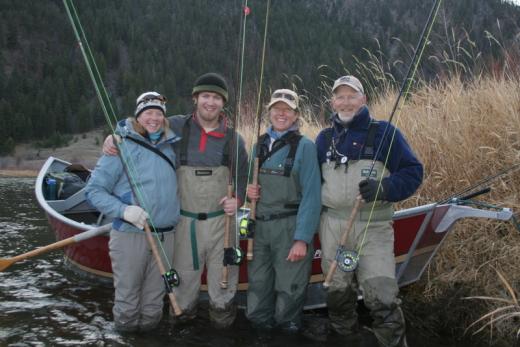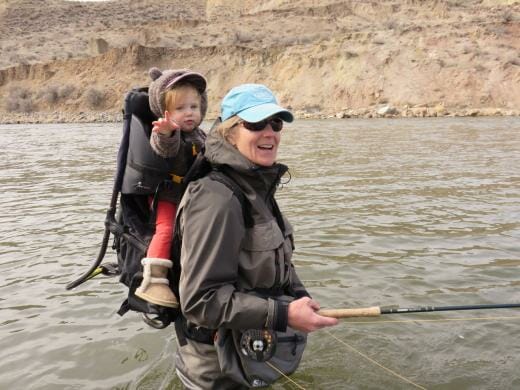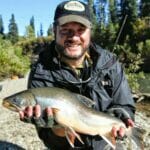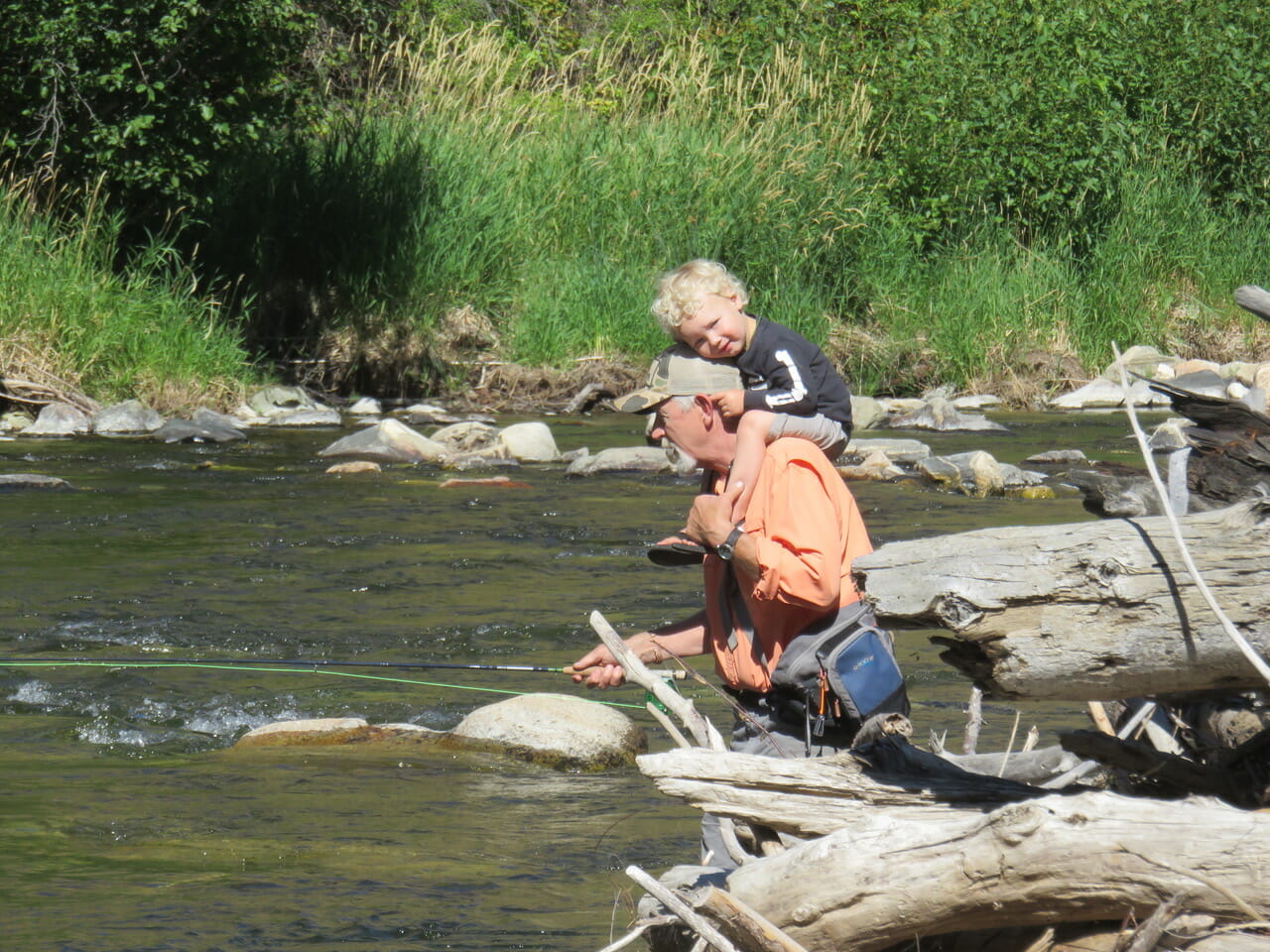Jerry Myers gives his grandchild Elkan a perfect perch to enjoy fishing with his grandpa. Courtesy Jerry Myers.
By Jerry Myers
I am an Idaho salmon and steelhead angler edging into my 6th decade. What I am witnessing this year feels uncomfortably similar to the despair of the mid 1970s and early 1990s. Wild steelhead and Chinook salmon counts are back near their desperately low post-dam building numbers.
Having spent 40 years advocating for wild fish in Idaho rivers, it can be depressing to yet again be wading into the same turbulent political and economic waters. Current discussion about Idaho’s salmon and steelhead future is centered largely on costs related to loss of fish and fishing opportunity, loss of electricity, loss of commodities transportation via barging, loss of biological diversity and loss of habitat.
Much less discussion is taking place regarding the spiritual value of these fish and related spiritual values fishing opportunities provide to Idahoans like my family. Stated differently — what part of ourselves would be lost if salmon are allowed to slip away?

Jerry Myers (right) fishes with his wife Terry and their children Jo and Sam. Courtesy Jerry Myers.
Perhaps older white guys like myself should not be engaged in attempting to explain the spiritual significance of what these fish mean. After all, our Native American brothers and sisters have taken on that role since Euro-Americans first laid eyes on the unconceivable, bountiful runs of the Northwest.
Native Americans have a 10,000-year relationship with salmon and it was bedrock to their physical and spiritual being. While it would be difficult for me to understand and accurately interpret Native American salmon relationships (steelhead and lamprey included), let me attempt to explain the spiritual relationship I have to these fish from the sea. Especially relative to my own immediate family and why wild steelhead are such a bone-deep part of our lives.
My parents were small Palouse-area farmers and ranchers who worked very hard to give their five kids a decent upbringing. Decent upbringing included that we grow up understanding our responsibility to the land, have respect and awe for wildlife, wild places and respect for others. My parents were generally in favor of building the Port of Lewiston and the four lower Snake River dams, which made a seaport in Idaho possible.

Terry Myers fishes for steelhead with her granddaughter Ettie. Courtesy Jerry Myers.
Their wheat got to Portland cheaper on barges and so each bushel we took off the farm became that much more valuable. More in the bank to feed and clothe a family. Crop transportation costs still remain the main economic issue for farmers when it comes to barging grain to Portland. But farmers do not pay all the actual costs of barging, the taxpayer also contributes significantly by subsidizing the economic and environmental costs associated with the lower Snake River dams.
I saw my first steelhead as a young lad walking along the creek that ran through our ranch. Seeing a fish the size of my leg — which appeared like a ghost in a small turbid pool — was one of those life-altering events. I still have reoccurring dreams of that spring spawning steelhead.
When my Dad retired from farming and cattle ranching, he again took up steelhead fishing on the Clearwater River with a zealot’s focus. Free from the time constraints farming and raising kids requires, he spent days, often by himself, chasing steelhead.
I still cherish those too few days when we fished together and talked about many things that we had only argued about in the earlier trying years of the 60s and 70s. Fishing was the neutral zone. I took my future wife, Terry, steelhead fishing with Dad in the late 70s and we landed four steelhead that day. Fishing was a huge part of her family upbringing as well.
Terry and I opened our own river guiding business in 1982 and started our family a year later. Our two kids were largely raised on the river and became guides as soon as they reached 18. We fished together constantly, commiserated during the low fish run years and celebrated the stronger runs. Fishing fed our family both directly and indirectly through guiding wages. Our five grandkids, all under age 7, are already steelhead fishing veterans. Nothing excites them more than watching steelhead spawn in our nearby creek. They too are gaining a passion for wild creatures and wild places.
Wild Steelheaders United- Myers from Trout Unlimited on Vimeo.
Our story is not that different than many Idaho families who also share our passion for fishing, hunting and exploring Idaho’s special places. I can’t fathom an Idaho that no longer has wild steelhead nor the collective will to fight to protect them, within our state borders or beyond. I struggle to find words to accurately describe to others what these fish mean to us. How do we defend a spiritual need for wild things within an economic argument? We simply cannot assign a value to that innate part of ourselves that needs wildlife and wild fish and we should never attempt to do so. Salmon have been a part of the Northwest for many thousands of years and I cannot conceive that within my lifetime we have gone from relative abundance to near extinction.
I find my faith in places where wild steelhead swim. It is here, in those places, that our family experiences beauty, an appreciation and empathy for those creatures nonhuman, a sense of humbleness in a natural world of which we are just a part. If we lose wild steelhead and salmon, we lose a part of our connectedness to our Creator, because our family believes they are part of the same.
Visit Wild Steelheaders United for infomation about how you can get involved.
Jerry Myers lives with his wife Terry on a steelhead creek near Salmon, Idaho. Jerry serves on the board for the River of No Return Chapter of Trout Unlimited. He also previously worked as the Upper Salmon Project Manager for Trout Unlimited. This piece orginially appeared in the Idaho Falls Post Register as an op-ed.



